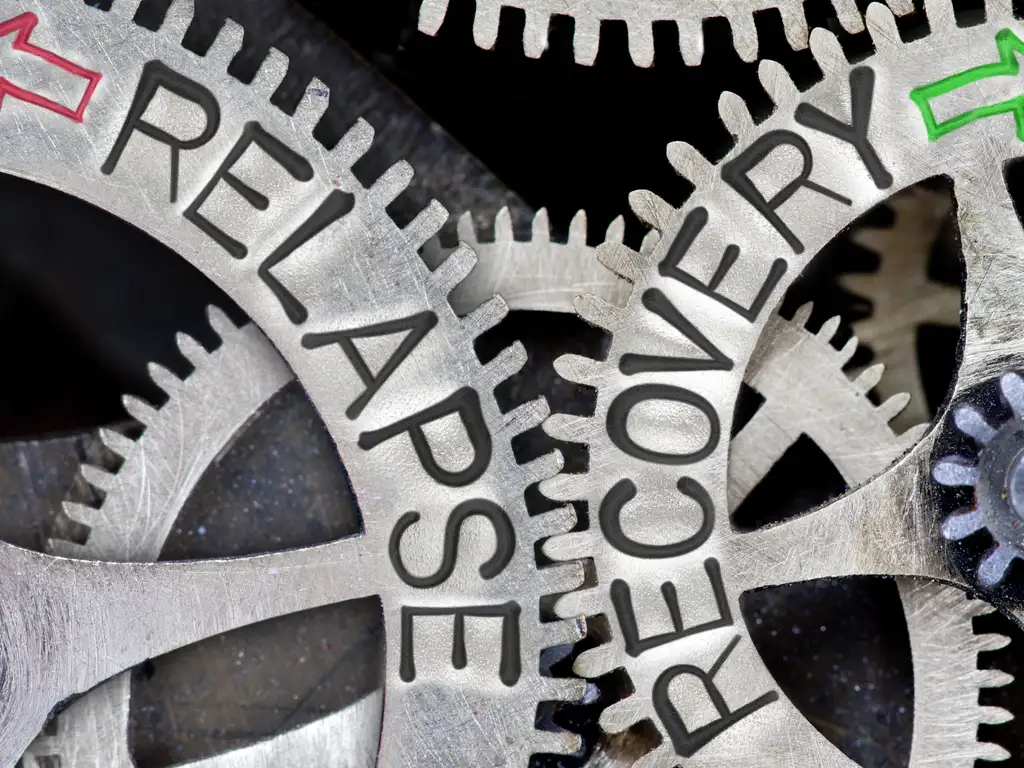The word relapse is defined, with regard to substance use or alcoholism, as a return to a previous maladaptive or self destructive condition or behavior. Because dealing successfully with any addiction can be extremely overwhelming and difficult, its important to understand that if you choose to do so, it will be a lifetime job.
If you have achieved a period of abstinence after years of struggling with alcoholism, substance use or addiction, obviously the best path forward is to stay sober, clean and/or abstinent. The aim of this article is to present some information to prevent a future relapse and to be aware of relapse risk factors and relapse warning signs.
Remember, the main characteristic of any addiction is that it will be progressive – which means the substance use disorders get worse, never better, over time.
What it Means to Relapse
A relapse means different things to different people, and the consequences of any mental relapse or sobriety relapse can vary greatly. Of course, achieving recovery from any addiction means that some changes will need to be made. These changes should include some sort of recovery process and a relapse prevention plan. Otherwise, the alcoholic/addict will be putting any recovery they may achieve, in a worse state than previous levels of being.
Every full blown relapse has one thing in common – the recovery plan was insufficient. Period.
Of course, there are many causes and reasons that addiction may occur. These include mental health conditions and physical health issues. In seeking relief from stress, anxiety or depression, an individual may begin to place them selves in high risk situations and think recreational drug use is no longer a higher risk behavior. Additionally, there are some physical and mental health issues or medical conditions that may involve the use of addictive drugs, which is strongly not suggested without support groups and several attempts at finding another and if unable – to check in with friends and family members so bad habits do not return, Relapse in not an accident and there is no partial recovery. It is said a person returns to their former state and the disease of addiction or alcoholism has continued to grow in the background. Relapsing can take you from a healthy way of life to addiction treatment programs or a new comer in attending 12-step support groups.
A Greater Risk
During relapse the addict or alcoholic can be at greater risk of incurring not only serious legal issues, but of also losing their income, their home and worst of all – their relationships. When it comes to addiction treatment, a relapse prevention plan is crucial.
Substance use disorder involves not only physical addiction to a drug such as alcohol or an opiate like heroin, but is also a mental, emotional, and spiritual malady. Therefore, much will need to change if relapse is to be prevented, and recovery maintained.
Coping Skills
Whether you are a teenager or an adult, we know that life can be stressful. However, individuals who never developed healthy coping skills, will often turn to drug use as a way to deal with and reduce that stress, and therefore try and avoid the difficulties in their lives.
Because people do not begin recreational substance use and progress to abusing substances for no reason, it’s important to recognize some of factors that can play a part. Whether it’s an internal struggle, such as a mental health condition like trauma, depression, anxiety, or a chronic illnesses. External stress from jobs, or relationships, can also contribute.
The development of healthy coping skills means learning other ways to deal with the stress and discomfort that can be part of life, and can be vital to attain and maintain recovery from addiction.
Alcohol Abuse
To those of us prone to addiction, the recreational use of substances like alcohol, or drugs will progress to substance use disorder. For example, the co-called social drinker who may find themselves progressing to what is known as a “problem drinker”. This is an individual that is beginning to experience problems in relationships, at work, or legally. Some people are able to recognize this fact, and stop before it is too late.
The alcoholic, however, is unable to stop drinking based on harmful consequences or even self knowledge alone. Unfortunately it may take several tragic events where drugs or alcohol are involved for the real alcoholic or drug addict to become willing to make the required changes in their life.
There is a saying for one who has repeated relapse years and is active in life then relapsing on alcohol – “They needed to do a little alcohol research”. Previously improved people with the disease of addiction or alcoholism for example find it very hard after they have relapsed to ask for help again.
Anyone who is in recovery from alcohol or other drugs remember the “original infection” and former state of no self care and feeling like a failure. Alcoholism is a disease. Health and happiness can come for even for those with multiple relapses.
Sudden Relapse
In case you were wondering about it, there is no such thing as a “sudden relapse”. A relapse is planned, sometimes weeks in advance, even if the alcoholic, or addict, is unaware of it themselves. This is the reason a relapse prevention plan is so vital. The opposite of poor self care is obviously a healthy lifestyle. Addiction flourishes in the dark. One of the main keys to preventing relapse is connection with others. Connection is the opposite of addiction, and social connection can prevent future relapses.
Environment can also be a major contribution to either recovery, or a plan to relapse. If we associate ourselves with people we used to drink or use with, or frequent places where we used or drank, we are setting ourselves up for relapse.
Relapse Risk Factors – Triggers and Stress
Relapse risk factors to be aware of include such things as exposure to ‘triggers’. A trigger can be anything that brings back fond memories of using or drinking. Going to a bar or some other location that you used to frequent, or going to a party where everyone but you is drinking! Experiencing a trigger is a definite relapse risk factor. A trigger can be social or environmental cues that remind you of using drugs, alcohol, or engaging in an addictive behavior.
Stress can be a component in a relapse, and it comes in many forms; you may even be under a stress that you are unaware of, because it feels “normal”. Somewhere along the line you may have become accustomed to being hyper vigilant, or anxious, for instance.
Mostly, stress originates in our personal relationships, or from issues in our work – either too much, or not enough! It is very important to establish some form of stress reduction plan such as yoga, meditation or exercise to try and minimize the stress of everyday life. These activities can help in maintaining our recovery by achieving emotional, as well as physical, health.
Social Support
Yet another factor for relapse can be peer pressure. This is where some form of social support is vital. It is important to avoid the people and places that kept us active in our various addictions, when first establishing physical sobriety of any kind.
A social support system can come from many sources: friends, family or a 12 step group. Or, hopefully all three. And this will sound like complete anathema to an active alcoholic or addict, but an additional benefit of developing a social support system is that you might find one person that you can trust to confide in and to whom you can be accountable. That alone can go a long way toward preventing relapse.
Negative Emotions
One of the major benefits of involvement with 12 step recovery is that we become a part of something bigger than us. We humans are social animals and need others in order to navigate the problems and successes in life, because we used to drink or use over both.
Pain due to injuries, accidents, or medical issues can generate negative feelings in us. These feelings can in turn contribute to a possible relapse. Many individuals have found support and fellowship in groups that address these specific issues. If you or a loved one is suffering from addiction or alcoholism due to pain or illness, it can be very helpful to have emotional support and someone to confide in about your struggles.
Low self esteem and self hatred is another relapse danger area for many addicts and alcoholics The shame and guilt we carry into sobriety can be formidable. By the time most of us arrive at “the jumping off point”, meaning the point at which we decide to to stop digging our particular hole, these feeling can be overwhelming. Emotional support from a trusted individual in these times can bring healing and a calming effect. This can in turn help us to generate a positive outlook for ourselves and help prevent relapse.
Withdrawal Symptoms
After a sustained period of chronic alcohol or drug use, and as we begin our journey to a new life, experiencing withdrawal symptoms can create intense cravings. Our brains demand a return to the old life; the brain and body rebel and are clamoring for more of the harmful substance from which we are trying to break free.
For this reason, long term, chronic drug abuse and alcoholism generally require medical detox in order to overcome what can initially be an overpowering desire to use. There is always a risk of relapse. Remember though, the risk is greatest of all when we begin to believe that we alone can handle our situation.
Eating Disorder
Up until now we have been discussing relapse involving substances. However, a relapse involving an eating disorder can be just as harmful to the individual. Relapse with an eating disorder involves many of the same mental processes as does relapse on substances.
In addition to treatment for substance abuse and mood disorders, Turning Point of Tampa also has a treatment program for eating disorders which involves healthy eating plans that avoid trigger foods, emotional support while you are in the process, and information for developing the skills needed to maintain abstinence after you leave treatment.
Relapse Prevention
Because many addictions begin as a maladaptive coping mechanism – to deal with stress, depression, anxiety or some other troublesome area of life, one of the most important ways to maintain long term abstinence and sobriety post treatment is learning coping strategies.
The good news is that learning new ways of dealing with old issues is possible. Many individuals have found new answers to old questions through connection to a 12-step type recovery program. And there are as many 12-step programs as there are addictions! The most important thing to remember is that the answers to maladaptive behaviors like addiction are found in some sort of social, spiritual and emotional development.
Treatment Programs
When it comes to recovering from the destructive consequences of addiction, whether the destruction came from alcohol, substance abuse, an eating disorder – or all three – there are treatment options available. From 1:1 therapy or family therapy, to outpatient treatment or residential treatment.
For more information on treatment options, visit the The National Institute on Drug Abuse and the Substance Abuse and Mental Health Services Administration websites. Both have additional information about where to find help in your community.
Turning Point of Tampa
One of the best options in the Tampa area is the treatment program at Turning Point of Tampa. Turning Point of Tampa offers a full continuum of care with options like Residential Treatment, Day Treatment, Intensive Outpatient Treatment and inpatient detox for alcohol and drug addiction. Turning Point of Tampa also has a well established treatment program for eating disorders and dual diagnosis, as well.
The treatment team at Turning Point of Tampa are dedicated to providing our clients a safe and supportive space as well as state of the art treatment modalities in order to help every person that chooses recovery to find their way back to a productive and healthy life.
The medical director at Turning Point of Tampa is Hardeep Singh, MD, FASAM – Dr. Singh received his medical degree from King George’s Medical College and has been in practice for more than 20 years. Dr. Singh is a member of The American Society of Addiction Medicine (ASAM). Founded in 1954, ASAM is a professional medical society representing over 6,000 physicians, clinicians and associated professionals in the field of addiction medicine.







